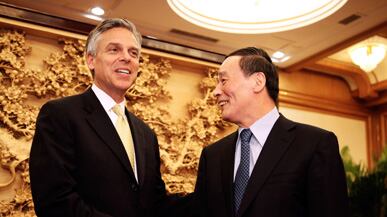With Jon Huntsman gearing up for a presidential campaign, political pundits are zeroing in on how the Republican’s service as the Obama administration’s ambassador to China will affect his chances in the GOP primary.

Real answers to that question won’t come until voters begin pulling levers, but in the meantime, something else is coming into focus: how the Huntsman 2012 buzz, which began a full four months before he officially left the Obama administration, affected his service in China.
An embassy official who worked closely with Huntsman in Beijing told The Daily Beast that the last few months of the ambassador’s tenure were marked by friction with the White House. After a January Newsweek article set off a flurry of speculation that Huntsman would make a bid for the presidency, the Obama administration began taking aggressive measures to ensure that Huntsman wouldn’t be able to use his appointment for 2012 posturing, said the official, requesting anonymity to discuss internal matters.
“Once the resignation was submitted, politics probably became much more of a question mark, and it was tense,” the official said. “On the embassy side, there was suspicion that [Huntsman] was being subjected to greater scrutiny than he would have otherwise been.”
According to the official, who was not a political appointee, the administration began micromanaging Huntsman’s schedule, canceling media appearances and carefully vetting his public remarks. The source specifically noted a major education speech in Shanghai that was heavily scrutinized by administration officials “to make sure it was kosher.”
“There may have been some [Chinese officials] who thought they could split Washington and take advantage of what they thought was a disconnect in American policy toward China.”
Reached for comment by The Daily Beast, the White House had nothing but kind words for Obama’s would-be opponent and disagreed with the characterization that Huntsman was reined in after indicating his intentions.
“As the president himself said, he couldn’t have been happier with Ambassador Huntsman’s dedication to representing our interests in Beijing,” said White House deputy press secretary Josh Earnest. “And he was pleased with their working relationship during the ambassador’s nearly two-year tenure in the Obama administration.”
But while both sides put on happy faces in public, the official said Huntsman didn’t take kindly to the enhanced supervision or the U.S. media speculation that he was abdicating his responsibilities to pursue a personal agenda.
“He was very upset when people began to question his commitment to the job, that people would question his character like that,” said the embassy official, who added that he never saw Huntsman put his own career ahead of his ambassadorial duties. “I’m sure he wished he had only agreed to stay another two weeks after he submitted his resignation, but he stuck through it.”
If history is any indication, the tension between the embassy and the White House may have been inevitable. In 1964, Henry Cabot Lodge, while serving as U.S. ambassador to South Vietnam, won the New Hampshire Republican primary with a write-in campaign organized by a band of supporters. Lodge never officially threw his hat in the ring, but he didn’t go out of his way to squash campaign efforts either. And while write-in attempts failed in subsequent primaries, the damage to his relationship with President Lyndon B. Johnson had already been done.
“Democrats, including Johnson, were always suspicious of what Henry Cabot Lodge was up to,” said Princeton presidential historian Julian Zelizer. “They were always wondering what the things he did in Vietnam had to do with his presidential aspirations.”
Today the same concerns are being voiced about Huntsman, with observers on both sides of the aisle questioning his motives in China. Erick Erickson, editor of RedState.com and an influential voice in the GOP base, wrote Monday that it was unacceptable for an ambassador of any party to consider challenging the president while still working in his administration.
“While serving as the United States ambassador to China, our greatest strategic adversary, Jon Huntsman began plotting to run against the president of the United States,” Erickson wrote. “This calls into question his loyalty not just to the president of the United States, but also his loyalty to his country over his own naked ambition.”
A Huntsman supporter fired back at the allegations ( as did others), telling The Daily Beast: “Questioning the patriotism of someone who has admirably served his country under four presidents is absurd. Governor Huntsman’s tenure in China has received nothing but plaudits from former ambassadors, China experts, the business community, and human-rights advocates.” (The supporter asked for anonymity to engage in the debate without the prospective candidate’s permission.)
Through a spokesman, Huntsman declined to comment for this article.
But even if Huntsman kept his political aspirations separate from his diplomatic work, as most people familiar with the situation have indicated, observers say the presidential buzz unquestionably affected his relationship with the Chinese government.
“There may have been some in Chinese policymaking circles who thought they could split Washington and take advantage of what they thought was a disconnect in American policy toward China,” said Russell Moses, a Beijing-based political analyst.
Experts in China also said the 2012 speculation colored the perception of Huntsman’s actions by the country’s government and citizens.
When Huntsman delivered a pointed speech at the end of his term condemning China’s human-rights record, many took it not as a genuine indictment but an effort to impress “the electing populace,” said Guo Xiangang, vice president of the China Institute of International Studies in Beijing.
Another international relations expert in China, who requested anonymity to address the sensitive issues, confirmed the sentiment.
“Right before he left, he showed his tougher side,” the expert said, citing Huntsman's mysterious appearance at a pro-democracy Jasmine Revolution protest as evidence that he was flexing his muscles.
At the time, the embassy said Huntsman simply stumbled upon the protest and was not there as a participant. But while attending a pro-democracy rally doesn’t necessarily run counter to Obama administration policy, some in China viewed it as a calculated move to please American voters, and one that came at a cost. After the ambassador’s appearance at the Jasmine protest, Chinese officials canceled meetings with Huntsman.
But apart from China’s reactionaries, one of whom took to the blogosphere to tell Huntsman to “scram” for “supporting political activities that subvert the Chinese government,” the predominant reaction in China to Huntsman’s shaky relationship with Obama has been one of confusion.
“I think people [in China] think it’s strange for an ambassador to turn against his boss,” said Yan Xuetong, dean of the Institute of Modern International Relations at Tsinghua University. “And people don’t understand why Obama nominated someone who’s going to run against him.”
If Huntsman keeps winning the rave reviews that followed his first public speech last weekend, that’s a question even the White House might find itself asking in the coming months.
With Isaac Stone Fish in Beijing, and Daniel Stone in Washington, D.C.
McKay Coppins is a reporter for Newsweek and The Daily Beast covering politics and national affairs. His writing has also appeared in The Daily Caller and Salt Lake City's Deseret News.





